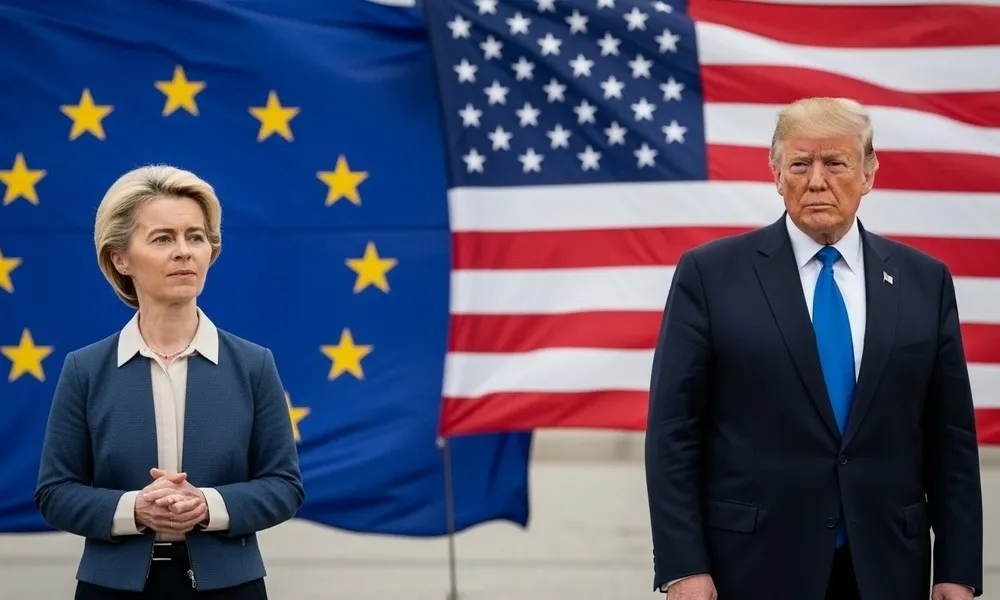Kostis Pitsilloudis - Brussels
Donald Trump’s second term has taken a markedly confrontational turn toward Europe, stoking unease across the continent. Moves to sideline EU leaders on Ukraine, new tariffs and threats of a trade war, and open alignment with far-right parties inside the EU have created what many in Brussels describe as an “invisible rupture” in transatlantic relations.
ECFR adds a cultural lens
A new study by the European Council on Foreign Relations (ECFR), published on September 23 2025, adds a cultural dimension to the rift. The report, “Reality show: Why Europe should not succumb to Trump’s culture war,” argues that the Trump administration’s rhetoric and tactics are fuelling a values clash with Europe, mobilising far-right ideologues and using public discourse to humiliate Europeans on the global stage.
Drawing on interviews and polling across all 27 EU member states, ECFR finds that this culture war extends beyond policy disputes into questions of identity, norms and the symbolic boundaries of “us.”
Two fronts: public and behind the scenes
According to ECFR, the confrontation plays out on two levels. Publicly, European backers of Trump, dubbed the “new right” in the report, normalise extreme positions and collide with liberal forces from the centre-right and centre-left. Behind the scenes, Washington under Trump seeks to portray Europe as incapable of acting on the world stage without US guidance. If internalised, the report warns, these repeated “humiliations” risk nudging EU politics toward cultural subservience.
The study also notes how Trump-aligned actors exploit real polarisation within European societies and divisions among EU leaders, amplifying both genuine and perceived dependencies on the United States. Paradoxically, ECFR says this plays out against a backdrop of robust pro-European sentiment across much of the Union.
Trumpists are not confined to policy and economic levers, the report argues. They deploy cultural instruments -images, language and symbols- especially on social media, to depict Europe as inferior or inconsequential. This is made easier, ECFR contends, by a weakening of shared European narratives within member states and the electoral rise of the “new right” in countries such as Hungary, Italy and Poland.
Two models diverge
Polling cited by ECFR shows a growing view of Europe and America as distinct democratic models. Majorities favour higher European defence spending and even explore alternatives to the US nuclear umbrella. Those who believe the US system works well tend to say “the EU is broken,” while respondents who see America as off course are likelier to view the EU as a “functioning model.”
ECFR recommends a three-part response:
-
Re-centre EU values. Europe’s mainstream parties should defend liberal democratic principles openly rather than edging right to stem voter losses, a tactic the report says weakens their own base and legitimises xenophobia and rule-of-law backsliding.
-
Swap appeasement for capacity. Efforts to “sweet-talk” Trump have failed, ECFR argues. Instead, European governments should assume more responsibility, investing in defence, technology and partnerships beyond Europe. The tariff fight showed the EU has tools to resist but under-used them. The aim: strategic autonomy and unity among the 27, while keeping doors open to cooperation.
-
Make the Commission a narrative-shaper. Brussels should move beyond crisis management and use trade, digital policy and cultural diplomacy to defend the European project in practice, citing recent antitrust action against Google and new trade initiatives as examples of pushback against US pressure.
European sentiment
Despite the noise, ECFR says indicators point to consolidation around the EU and its policies. The crises of the past decade appear to have strengthened Europeans’ sense that “collective action matters in an unstable world.” Trump’s culture war, the report argues, has clarified the values people expect the EU to embody and reinforced the case for strategic autonomy.
Eurobarometer trends over the last 20 years show average trust in the EU rising from 44% to 53.9%. Cyprus is among ten exceptions, with trust falling from 54% to 41%, alongside Greece, Slovenia, the Czech Republic, Italy, Belgium, Hungary, Slovakia, Romania and Bulgaria, mostly from the East or South and largely members since 2004. At the other end, Denmark now records 74% trust, with Portugal at 73% and Sweden at 71%.
Bottom line: ECFR’s message is blunt; Europe should not play by the rules of someone else’s reality show. Reasserting its own values, capabilities and narrative is the only credible way to navigate a more adversarial transatlantic era.
